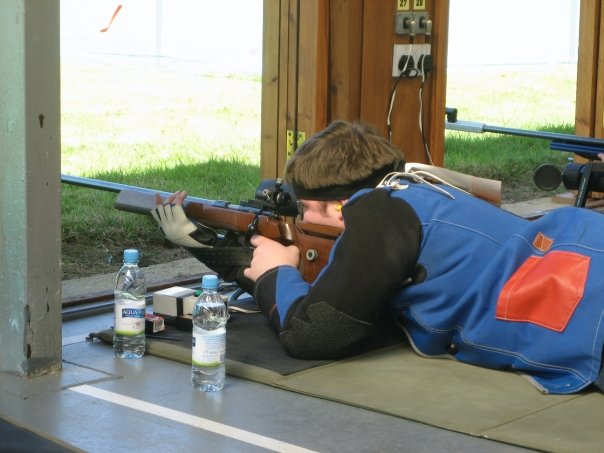This brings me onto this: Part of all good training is spending time reflecting on training as a process in order to plan future training, and part of training is finding your motivation to progress. On that thought, I've been away from the range for a week now, as I've been in Munich at a world cup, helping out with the Irish team. The trip has been all the kick I could ask for in terms of motivation to get back to training and to really direct myself. There's nothing like spending quality time with athletes above your own level to learn about the game on a level you can't experience yourself. I couldn't have spent the time so productively if I'd lived on the range here in a sleeping bag. The trip reaffirmed that I want to shoot internationally. I want to be part of that team. It also taught me a few valuable, practical lessons about shooting.
Probably the single biggest problem anyone who's largely self-taught has is that they can find themselves just shooting to improve, instead of concentrating on the elements which are deficient with a few to improving them. Certainly, this is an issue that plagued me for a long time. There is the other side of it, however, where you get obsesssed with details and while trying to improve individual elements, you can lose sight of the basic mechanics of shooting good shots, or worse, focus only on elements and forget that each shot is unique and distinct from what comes before and what comes after. In short, you just shoot strings of shots on autopilot while watching whatever your focus is for the day. I've been doing that so long, focusing on so many things, that my conception of shooting has switched from a series of processes to a single change of state: From not shooting to shooting, in short, rather than shooting each shot individually, distinctly and perfectly.
This results in psychological fatigue to an extent which prevents good shooting over the period of time necessary to complete any ISSF rifle course of fire. Rather than relaxing, then increasing concentration to fire a shot, then relaxing mentally before firing the next shot, you go from not-shooting to shooting, increasing your concentration level without any rest in sight and subsequently fail to notice as it trails off gradually and the standard of the shooting process goes down. This is why we have a shot routine which comprises phases of low and high concentration, or so we think, at least. If I'm being honest, my application of my shot routine might be excellent for a few shots, but I certainly slip into the habit of throwing shot after shot down the barrel without proper attention to the process as I fatigue physically and mentally. This is the single most important thing I have to change. Initially, this shot routine will have to be comparatively simple until the habit is ironed in. It is quite apparent to me, however, that finding a way to consider shots individually is the single most important thing to allow me to develop coping mechanisms for stress and to achieve consistent results.
My focuses for the next while have to be some of the following:
-Relaxing and feeling for the inner position. Time must be devoted to this at every session, just feeling for balance, feeling the heart rate slow and soften. This must be consistent, shot to shot, and will help to conceive shots individually as well.
-Long follow through to help separate shots mentally.
-Mentally thinking through shot routine before physical performance of each shot. If necessary, talking through the shot routine as I go through it (I want to develop "triggers" as detailed in Mental Training for Shooting in order to define the sections of the shot routine for evaluation and consistent performance.
I'll be meeting with my coach next week in order to compose a training plan leading up towards my one year aim, which is to attend the world cups in Milan and Munich next year if exams allow. Certainly, Munich should be perfectly achievable as it's later, starting on the 20th of May. My goal is to qualify for that and to perform well at it. This means I have to greatly improve my consistency from shot to shot and concurrently develop coping strategies for stress and dealing with unexpected results. I'm optimistic, as ever, but perhaps there's more substance to this plan.
